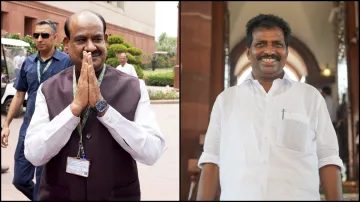New Delhi: BJP's Om Birla and Congress leader Kodikunnil Suresh will face off against each other in the upcoming election for the post of Speaker in the 18th Lok Sabha on Wednesday, an unprecedented moment as it is the first such contest after nearly five decades. The polling will take place in Lok Sabha tomorrow as the first parliamentary session under the new government is underway.
The election will be a rare event in the lower house of the Indian parliament as it is the first contest for the post of Speaker since 1976. The Bharatiya Janata Party (BJP)-led National Democratic Alliance (NDA) nominated Om Birla for a second consecutive term at the post of the presiding officer of the Lok Sabha, while INDIA bloc nominated K Suresh was the opposition candidate.
The NDA has 293 MPs while the opposition INDIA bloc has 234 MPs in the 543-member Lok Sabha. A few independent MPs have announced their support to the Congress but the ruling alliance has a clear majority in the House. This means Birla is most likely to retain the office of Speaker of the Lok Sabha for the second term.
When were past elections for Lok Sabha Speaker held?
Prior to independence, elections for the Speaker's post were a common procedure. However, only three elections for the position of the presiding officer were seen in the Lok Sabha - 1952, 1967 and 1976.
- 1952: Congress member G V Mavalankar prevailed in the contest against opponent Shankar Shantaram More in 1952. Malvankar was nominated by then-Prime Minister Jawaharlal Nehru, while More's candidature was backed by Left parties. Mavalankar ended up with 394 votes as compared to More's 55. In a coincide, K Suresh and More - both opposition candidates - also belong to the same constituency, Mavelikara. Another coincidence is the focus on the government's decision to appoint Deputy Speaker from the opposition
- 1967: After Indira Gandhi came to power, Congress leader Neelam Sanjiva Reddy was pitted by the Congress against independent MP Tenneti Viswanatham, who was backed the CPI(M). Reddy was elected as the Speaker, having polled 278 votes against Viswanatham’s 207.
- 1976: The fifth Lok Sabha was the last time (before June 26) when the election for the post of the Speaker was held, following the imposing of the Emergency by Indira Gandhi in 1975. Then-Speaker GS Dhillon resigned on December 1, 1975, and Gandhi backed Baliram Bhagat from her faction of the Congress for the post. However, Prasannabhai Mehta of the Congress (O) moved the motion in favour of Jana Sangh leader Jagannathrao Joshi. Bhagat prevailed with 344 votes while Joshi could only manage 58.
Which Speakers have retained their posts as Speaker?
In 1998, the then Congress leader Sharad Pawar had moved a motion to elect P A Sangma as the Speaker, which was rejected. After the rejection of Pawar’s motion, the then Prime Minister Atal Bihari Vajpayee moved a motion to choose TDP member G M C Balayogi as the Lok Sabha Speaker, which was adopted.
Since independence India, only four Speakers - Congress' MA Ayyangar, GS Dhillon, Balram Jakhar and TDP's GMC Balayogi - were re-elected in subsequent Lok Sabhas. Ayyangar succeeded Mavalankar and served in 1952 and 1957. Jakhar was the Speaker of the seventh and the eighth Lok Sabhas and holds the distinction of being the only presiding officer to complete two full terms.
Om Birla is poised to become the fifth leader to serve a second term as the Lok Sabha Speaker. His Lok Sabha tenure started in 2014 after he won the Kota constituency on the BJP ticket. Five years later he was elected as the Speaker of the House on June 19, 2019. He succeeded Sumitra Mahajan who served as the Speaker in the 16th Lok Sabha from 2014 to 2019.
During his tenure, Lok Sabha passed some of the momentous bills which have the potential to change the course of society including the Muslim Women (Protection of Rights on Marriage) Act, 2019, and the Women Reservation Act, 2023. He is the first Speaker to have chaired the session in the new Parliament.
(with PTI inputs)
ALSO READ | Om Birla vs K Suresh: A look at Lok Sabha Speakers who remained in office for two consecutive terms
Latest India News
